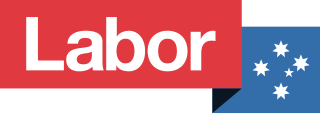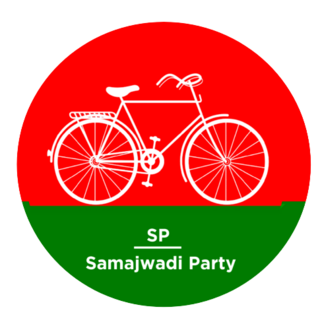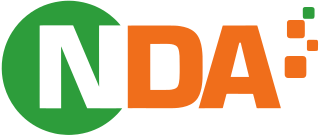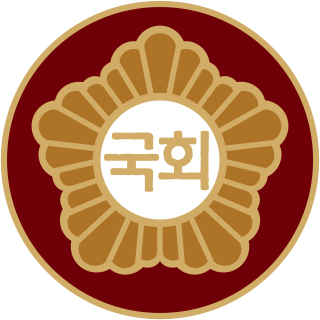
The Australian Labor Party (ALP), also commonly known as the Labor Party or simply Labor, is the major centre-left political party in Australia and one of two major parties in Australian politics, along with the centre-right Liberal Party of Australia. The party has been in government since being elected at the 2022 federal election, and with political branches in each state and territory, they currently form government in New South Wales, Queensland, South Australia, Victoria, Western Australia, the Australian Capital Territory, and the Northern Territory. As of 2023, Tasmania is the only state or territory where Labor forms the opposition. It is the oldest continuous political party in Australian history, being established on 8 May 1901 at Parliament House, Melbourne, the meeting place of the first federal Parliament.

The Chinese Communist Party (CCP), officially the Communist Party of China (CPC), is the founding and sole ruling party of the People's Republic of China (PRC). Under the leadership of Mao Zedong, the CCP emerged victorious in the Chinese Civil War against the Kuomintang. In 1949, Mao proclaimed the establishment of the People's Republic of China. Since then, the CCP has governed China and has had sole control over the People's Liberation Army (PLA). Successive leaders of the CCP have added their own theories to the party's constitution, which outlines the party's ideology, collectively referred to as socialism with Chinese characteristics. As of 2023, the CCP has more than 98 million members, making it the second largest political party by membership in the world after India's Bharatiya Janata Party.

The Nazi Party, officially the National Socialist German Workers' Party, was a far-right political party in Germany active between 1920 and 1945 that created and supported the ideology of Nazism. Its precursor, the German Workers' Party, existed from 1919 to 1920. The Nazi Party emerged from the extremist German nationalist, racist and populist Freikorps paramilitary culture, which fought against communist uprisings in post–World War I Germany. The party was created to draw workers away from communism and into völkisch nationalism. Initially, Nazi political strategy focused on anti–big business, anti-bourgeois, and anti-capitalist rhetoric; it was later downplayed to gain the support of business leaders. By the 1930s, the party's main focus shifted to antisemitic and anti-Marxist themes. The party had little popular support until the Great Depression, when worsening living standards and widespread unemployment drove Germans into political extremism.

The Libertarian Party (LP) is a political party in the United States that promotes civil liberties, non-interventionism, laissez-faire capitalism, and limiting the size and scope of government. The party was conceived in August 1971 at meetings in the home of David F. Nolan in Westminster, Colorado, and was officially formed on December 11, 1971, in Colorado Springs. The organizers of the party drew inspiration from the works and ideas of the prominent Austrian school economist, Murray Rothbard. The founding of the party was prompted in part due to concerns about the Nixon administration, the Vietnam War, conscription, and the introduction of fiat money.

The Republican Party, also known as the GOP, is one of the two major contemporary political parties in the United States. It emerged as the main political rival of the Democratic Party in the mid-1850s.
The Whig Party was a conservative political party that existed in the United States during the mid-19th century. Alongside the slightly larger Democratic Party, it was one of the two major parties in the United States between the late 1830s and the early 1850s as part of the Second Party System. Four presidents were affiliated with the Whig Party for at least part of their terms. Other prominent members of the Whig Party include Henry Clay, Daniel Webster, Rufus Choate, William Seward, John J. Crittenden, and John Quincy Adams. The Whig base of support was centered among entrepreneurs, professionals, planters, social reformers, devout Protestants, and the emerging urban middle class. It had much less backing from poor farmers and unskilled workers.
The Conservative Party, officially the Conservative and Unionist Party and colloquially known as the Tories, is one of the two main political parties in the United Kingdom, along with the Labour Party. It is the current governing party, having won the 2019 general election, and has been the primary governing party in the United Kingdom since 2010. The party sits on the right-wing to centre-right of the political spectrum. It encompasses various ideological factions including one-nation conservatives, Thatcherites, and traditionalist conservatives. The party holds the annual Conservative Party Conference, at which senior Conservative figures promote party policy.

The Bharatiya Janata Party is a political party in India and one of the two major Indian political parties alongside the Indian National Congress. Since 2014, it has been the ruling political party in India under the incumbent Prime Minister Narendra Modi. The BJP is aligned with right-wing politics and has close ideological and organisational links to the Rashtriya Swayamsevak Sangh (RSS) volunteer paramilitary organisation. Its policies adhere to Hindutva, a Hindu nationalist ideology. As of January 2024, it is the country's biggest political party in terms of representation in the Parliament of India as well as state legislatures.

The Indian National Congress (INC), colloquially the Congress Party or simply the Congress, is a political party in India with deep roots in most regions of India. Founded on 28 December 1885, it was the first modern nationalist movement to emerge in the British Empire in Asia and Africa. From the late 19th century, and especially after 1920, under the leadership of Mahatma Gandhi, the Congress became the principal leader of the Indian independence movement. The Congress led India to independence from the United Kingdom, and significantly influenced other anti-colonial nationalist movements in the British Empire.

The Communist Party of India (Marxist) (abbreviated as CPI(M)) is a communist political party in India. It is the largest communist party in India in terms of membership and electoral seats, and one of the national parties of India. The party was founded through a splitting from the Communist Party of India in 1964 and it quickly became the dominant fraction.

The Communist Party of India (CPI) is the oldest communist party in India. The CPI was founded in modern-day Kanpur on 26 December 1925.

The Samajwadi Party is a socialist political party in India. It was founded by formerly Janata Dal politician Mulayam Singh Yadav and is headquartered in New Delhi. The Samajwadi Party is currently led by former Chief Minister of Uttar Pradesh, Akhilesh Yadav. He was chosen as the President for the first time in an Emergency meeting in 2017. He was chosen for second time in 2017 at Agra Convention of Samajwadi Party. He was chosen for the third time at the party's national convention held in September 2022 at Lucknow.

The National Democratic Alliance (NDA) is a centre-right to right-wing conservative Indian political alliance led by the right-wing Bharatiya Janata Party (BJP). It was founded in 1998 and currently controls the government of India as well as the government of 17 Indian states and one Union territory.

The National Assembly of the Republic of Korea, often shortened to the National Assembly, is the unicameral national legislature of South Korea. Elections to the National Assembly are held every four years. The latest legislative elections was held on 10 April 2024. The National Assembly has 300 seats, with 253 constituency seats and 47 proportional representation seats; 30 of the PR seats are assigned an additional member system, while 17 PR seats use the parallel voting method.
An independent, non-partisan politician or non-affiliated politician is a politician not affiliated with any political party or bureaucratic association. There are numerous reasons why someone may stand for office as an independent.
The Labour Party is a political party in the United Kingdom that has been described as an alliance of social democrats, democratic socialists, and trade unionists. The Labour Party sits on the centre-left of the political spectrum. In all general elections since 1922, Labour has been either the governing party or the Official Opposition. There have been six Labour prime ministers and thirteen Labour ministries. Since the 2010 general election, it has been the second-largest UK political party by the number of votes cast, behind the Conservative Party and ahead of the Liberal Democrats. The party holds the annual Labour Party Conference.

The Aam Aadmi Party is a political party in India. It was founded on 26 November 2012 by Arvind Kejriwal and his then-companions, following the 2011 Indian anti-corruption movement against then Indian government of Indian National Congress. AAP is currently the governing party in the Indian state of Punjab and the union territory of Delhi. On 10 April 2023, AAP was officially granted the status of National party by ECI. The party's election symbol is a broom. The party is currently part of the coalition I.N.D.I.A Alliance.














